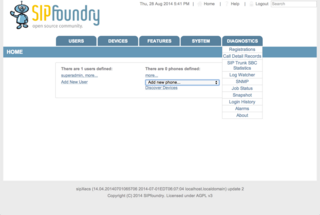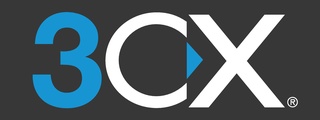Related Research Articles
Speech coding is an application of data compression to digital audio signals containing speech. Speech coding uses speech-specific parameter estimation using audio signal processing techniques to model the speech signal, combined with generic data compression algorithms to represent the resulting modeled parameters in a compact bitstream.
The Session Initiation Protocol (SIP) is a signaling protocol used for initiating, maintaining, and terminating communication sessions that include voice, video and messaging applications. SIP is used in Internet telephony, in private IP telephone systems, as well as mobile phone calling over LTE (VoLTE).
Voice over Internet Protocol (VoIP), also called IP telephony, is a method and group of technologies for voice calls for the delivery of voice communication sessions over Internet Protocol (IP) networks, such as the Internet.

Skype for Business Server is real-time communications server software that provides the infrastructure for enterprise instant messaging, presence, VoIP, ad hoc and structured conferences and PSTN connectivity through a third-party gateway or SIP trunk. These features are available within an organization, between organizations and with external users on the public internet or standard phones.

SipXecs is a free software enterprise communications system. It was initially developed by Pingtel Corporation in 2003 as a voice over IP telephony server located in Boston, MA. The server was later extended with additional collaboration capabilities as part of the SIPfoundry project. Since its extension, sipXecs now acts as a software implementation of the Session Initiation Protocol (SIP), making it a full IP-based communications system.
Gizmo5 was a voice over IP communications network and a proprietary freeware soft phone for that network. On November 12, 2009, Google announced that it had acquired Gizmo5. On March 4, 2011, Google announced that the service would be discontinued as of April 3, 2011.

Jajah was a VoIP provider, founded by Austrians Roman Scharf and Daniel Mattes in 2005. The Jajah headquarters was located in Mountain View, CA, USA, and Luxembourg. Jajah maintained a development centre in Israel. On 23 December 2009, it was announced that Jajah had been bought by Telefónica through its subsidiary Telefónica Europe. In December 2013, Telefónica announced that Jajah would shut down at the end of January 2014.
Internet Low Bitrate Codec (iLBC) is a royalty-free narrowband speech audio coding format and an open-source reference implementation (codec), developed by Global IP Solutions (GIPS) formerly Global IP Sound. It was formerly freeware with limitations on commercial use, but since 2011 it is available under a free software/open source license as a part of the open source WebRTC project. It is suitable for VoIP applications, streaming audio, archival and messaging. The algorithm is a version of block-independent linear predictive coding, with the choice of data frame lengths of 20 and 30 milliseconds. The encoded blocks have to be encapsulated in a suitable protocol for transport, usually the Real-time Transport Protocol (RTP).
internet Speech Audio Codec (iSAC) is a wideband speech codec, developed by Global IP Solutions (GIPS). It is suitable for VoIP applications and streaming audio. The encoded blocks have to be encapsulated in a suitable protocol for transport, e.g. RTP.

Jitsi is a collection of free and open-source multiplatform voice (VoIP), video conferencing and instant messaging applications for the Web platform, Windows, Linux, macOS, iOS and Android. The Jitsi project began with the Jitsi Desktop. With the growth of WebRTC, the project team focus shifted to the Jitsi Videobridge for allowing web-based multi-party video calling. Later the team added Jitsi Meet, a full video conferencing application that includes web, Android, and iOS clients. Jitsi also operates meet.jit.si, a version of Jitsi Meet hosted by Jitsi for free community use. Other projects include: Jigasi, lib-jitsi-meet, Jidesha, and Jitsi.
Click-to-call, also known as click-to-talk, click-to-dial, click-to-chat and click-to-text, is a form of Web-based communication in which a person clicks an object to request an immediate connection with another person in real-time either by phone call, Voice-over-Internet-Protocol (VoIP), or text. Click to talk requests are most commonly made on websites but can also be initiated by hyperlinks placed in email, blogs, wikis, flash animations or video, and other Internet-based object or user interfaces.
Unified communications (UC) is a business and marketing concept describing the integration of enterprise communication services such as instant messaging (chat), presence information, voice, mobility features, audio, web & video conferencing, fixed-mobile convergence (FMC), desktop sharing, data sharing, call control and speech recognition with non-real-time communication services such as unified messaging. UC is not necessarily a single product, but a set of products that provides a consistent unified user interface and user experience across multiple devices and media types.

Ribbit was a telecommunications company based in Mountain View, California. It was acquired by BT Group on July 29, 2008 for $105 million.

The 3CXPhone System is the software-based private branch exchange (PBX) phone system developed and marketed by the company, 3CX. The 3CX Phone System is based on the SIP standard and enables extensions to make calls via the public switched telephone network (PSTN) or via Voice over Internet Protocol (VoIP) services on premises, in the cloud, or via a cloud service owned and operated by the 3CX company. The 3CX Phone System is available for Windows, Linux, Raspberry Pi and supports standard SIP soft/hard phones, VoIP services, faxing, voice and web meetings, as well as traditional PSTN phone lines.
Cloud communications are Internet-based voice and data communications where telecommunications applications, switching and storage are hosted by a third-party outside of the organization using them, and they are accessed over the public Internet. Cloud services is a broad term, referring primarily to data-center-hosted services that are run and accessed over an Internet infrastructure. Until recently, these services have been data-centric, but with the evolution of VoIP, voice has become part of the cloud phenomenon. Cloud telephony refers specifically to voice services and more specifically the replacement of conventional business telephone equipment, such as a private branch exchange (PBX), with third-party VoIP service.
WebRTC is a free and open-source project providing web browsers and mobile applications with real-time communication (RTC) via application programming interfaces (APIs). It allows audio and video communication to work inside web pages by allowing direct peer-to-peer communication, eliminating the need to install plugins or download native apps.
Nefsis Corporation is a communications technology company. It was an early developer of real-time communications software and the first to use cloud computing in the videoconferencing industry.
Ingate Systems AB is a Swedish company that sells data network security and telecommunication equipment. The company primarily provides SIP Trunking of IP PBX:s on the US market. It is associated with sister company Intertex Data AB.
Spirit DSP is a Russian company that develops embedded software for real-time voice and video communication over IP networks – voice and video engines. Its voice and video software platform is used by carriers, mobile messaging apps, and social networks, serving more than 1 billion users in 100 countries.

Mavenir Systems was a software-based telecommunications networking provider based in Richardson, Texas that existed from 2005 to 2015. The company's software was aimed to deliver internet protocol (IP)-based voice, video, rich communications and enhanced messaging services to clients. Mavenir Systems provided service to approximately 120 mobile networks globally.
References
- ↑ "iLBC Freeware". Archived from the original on 2011-07-05. Retrieved 2011-06-23.
- ↑ GIPS 2008 Annual Report Archived 2010-08-13 at the Wayback Machine
- ↑ Wirevolution interview with Jan Linden
- ↑ TMC Labs VoiceEngine product review
- ↑ "GIPS customer list". Archived from the original on 2009-02-28. Retrieved 2009-07-27.
- ↑ "GIPS Executive Team". Archived from the original on 2009-03-02. Retrieved 2009-07-27.
- ↑ Google Buys GIPS to Challenge Skype in VOIP [ permanent dead link ], eweek, 2010-05-18
- ↑ Google WebRTC FAQ: Are the WebRTC components from Google's acquisition of Global IP Solutions? Archived 2011-06-07 at the Wayback Machine